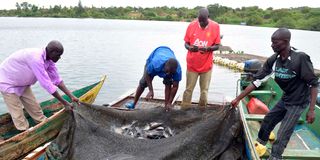How CCTV cameras have boosted security of fish cages in Lake Victoria

Farmers harvest fish from cages at Lake Victoria off the shores of Ugambe beach in Bondo, Siaya County on February 5, 2019.
What you need to know:
- The cages placed a few kilometers from the shores of Lake Victoria stand out with the two CCTV cameras mounted on metal poles.
- While the system surveillance team works in their Kisumu office on shifts, members can monitor the CCTV via apps on their phones.
Caroline Achieng, a fish monger at Paga Beach, Kisumu County, has been in the business since 2010.
But Ms Achieng admits that her business can only thrive if there is a good supply of fish.
She recalls one incident when she went without fish supply after her supplier, a cage fish farmer, lost a huge population of his fish to thieves.
The thieves struck at night and made a way with fish which was due for harvesting the following day.
“Theft of fish is not something new. It is common around the lake, especially at night when the owners have retreated to their homes,” says Ms Achieng.
It is for this reason that Aquaculture Barn Limited, Kisumu decided to incorporate the Close Circuit Television (CCTV) technology in monitoring the caged fish four months ago.
Mr Austine Owino, a member of the Paga Beach Management Unit (BMU) and also Aquaculture Ban Limited cage operations person, says one of the recent cases of theft at the beach was recorded last year.
The cage owner lost more than 1,200 mature fish to a thief who was later arrested, charged, and is currently awaiting sentencing.
He said for a long time, the cage farmers had relied on patrols by the BMU members and a night guard stationed at the lakeside.
The patrols are however done only four times a week, while the night guard relies on spotlights which are flashed towards the cages once in a while to scare away intruders.
In case of any cause for alarm, the guard will quickly call the BMU members before swinging to action.
He however said with the introduction of the CCTV cameras security has been greatly enhanced.
“We only need to hear the alarm or when the lights switch on to rush to the cages,” he says.

In this file picture, Mr Shelton Omollo feeds fish at his fish cages in Lake Victoria.
The cages placed a few kilometers from the shores of Lake Victoria, Kisumu West Sub County stand out with the two CCTV cameras mounted on metal poles and attached to the cages.
“We settled on CCTV cameras so we could monitor our cages. Additionally, we can also speak to our team once the camera is turned on or scare away the thief by just speaking to them,” said Mr Vincent Odiwuor, the chief Executive Officer of Aqua Barn Limited.
Unlike CCTV installation on the mainland, Mr Odiwuor said that the system requires one to fix the camera using an external power source such as a generator.
Once installed, the entire system is run using solar power. They also included an additional overhead solar light which lights up in case it detects any movement.
Mr Odiwuor said for efficient operations, they also make a monthly subscription to the internet to enable monitoring of the cages.
While the system surveillance team works in their Kisumu office on shifts, members can monitor the CCTV via apps on their phones from wherever they are.
“It cost us Sh40,000 to put up the entire system, we also renewed our monthly internet subscription at Sh3,000,” the CEO said.
The cameras have a sensor that activates an alarm whenever an intruder nears the cages. The CCTV operators can also speak to scare away the intruders.
During the night, the overhead light stationed at the fish cage automatically turns on whenever they sense movement.
According to Mr Odiwuor, the lights cannot be left on the entire night since they could interfere with the fish ecosystem.
“The cameras also enable us to monitor the number of times our employees at the beach feed the fish. They also ensure personal safety in case the waves are too strong.
“The camera audio also enables us to scare away birds of prey which are also after our fish while also acting as the means of communication between the surveillance team in the office and the employees at the site,” he said.
Mr Odiwuor also urged fish farmers to embrace the technology for security reasons.
With diversification in fish farming, and moving away from traditional aquaculture methods such as ponds and fishing, residents around the lake region have continued to heavily invest in fish cages.
The cages placed a few kilometers from the beaches can hold more than 10,000 fingerlings with an assured return to the investor who only needs to supply the caged fish with food. The lucrative venture is however threatened by theft.





